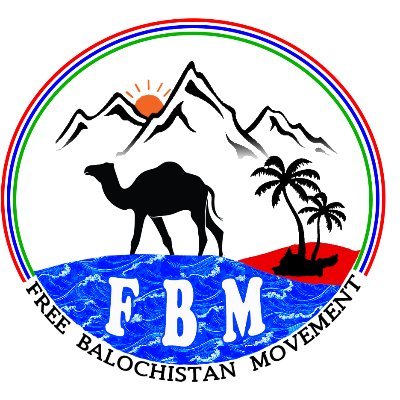Indian State Should Focus on Unconventional Methods: Jamal Nasir Baloch
Maulana Fazlur Rehman’s remarks confirm the failure of Pakistan military’s narrative in Balochistan: FBM

QUETTA: The spokesperson of the Free Balochistan Movement (FBM) in a statement to media said that Maulana Fazlur Rehman, president of Jamiat Ulema-e-Islam (JUI), a political figure considered close to the Pakistani establishment and a member of the Pakistani Parliament, has been continuously making statements about the advancements of the Baloch freedom movement in occupied Balochistan.
His remarks indicate the failure of Pakistani military’s narrative and the end of its brutal aggression against the Baloch nation. The fact that Fazlur Rehman, a pro-military religious extremist and an assembly member, acknowledged the popularity of the Baloch independence movement in his speech in the Pakistani Assembly is a moral victory for the Baloch nation and a psychological and ethical defeat for Pakistan.
Moreover, his speech exposes the lies of puppet ministers in occupied Balochistan, who, under the direction of the Pakistani military, attempt to mislead the international community through state-controlled media, glorifying Pakistani military generals. From the very beginning, Pakistan’s occupying army has tried to suppress the Baloch independence movement by dismissing it as a minor rebellion of a few tribal leaders. However, truth and ground realities cannot be hidden.
The FBM spokesperson further stated that through media, they want to bring to the attention of the international community that Balochistan has been in a state of war for the past seven decades. China is supporting Pakistan’s occupying military in its large-scale military aggression across occupied Balochistan to complete its mega-exploitative projects under CPEC, including the coastal areas of Gwadar.
In Balochistan, Pakistan’s ground and air forces are indiscriminately targeting Baloch civilians, and Pakistan’s Air Force is actively participating in aerial bombardments. Due to these airstrikes, several regions of Balochistan are experiencing a humanitarian crisis. Hundreds of thousands of Baloch people have been displaced from their ancestral lands, and thousands have been forcibly disappeared. Furthermore, Pakistan has allocated billions of rupees to escalate its military aggressions in Balochistan, but despite its limited resources, the Baloch nation stands firm like an iron wall to protect its national dignity, identity and homeland.
It should be noted that a few weeks ago, Maulana Fazlur Rehman addressed the so-called Pakistani National Assembly and said that the Baloch have now reached a position, if they declare independence, the Baloch public could support them.
During his speech, he depicted the state oppression in Balochistan and admitted: “Five to seven districts of Balochistan are now in a position that if they declare independence today, the United Nations will accept their request the next day, and Pakistan will be considered divided.”
The FBM spokesperson further added that despite being a long-time ally of the Pakistani occupying army and ISI, Maulana Fazlur Rehman is now acknowledging Pakistan’s moral, psychological, and territorial defeat in Balochistan. There should be no hesitation in stating that Pakistan now has only one option: to withdraw its occupying forces from Balochistan to avoid a situation similar to Bangladesh in 1971.
The FBM also urges the United Nations and the international community to break their silence and recognise the grave situation in occupied Balochistan. Now, even non-Baloch political and religious figures close to the Pakistani military acknowledge that Baloch independence is becoming a reality. Therefore, the UN must intervene immediately to prevent further humanitarian disasters in Balochistan.
The FBM further said that a free and independent Balochistan is essential for regional development, prosperity and peace. Recognizing Balochistan’s independence is the best solution to halt Pakistan’s extremism and expansionist ambitions and to prevent further bloodshed and instability in the region.
The spokesperson said that the United Nations and entire international community has a primary responsibility to act, just as the United Nations helped East Timor gain independence, rebuild the country, and establish a governmental system under UNTAET (United Nations Transitional Administration in East Timor), leading to East Timor’s independence in 2002.
Similarly, in the 1990s, Kosovo’s independence movement gained momentum, and in 1999, NATO’s intervention forced Serbian forces to retreat. Subsequently, the United Nations assumed its responsibilities by taking administrative control under UNMIK (United Nations Mission in Kosovo) and saved the region from a humanitarian crisis.
The situation in occupied Balochistan also demands intervention from international organisations, especially the United Nations.
South Sudan gained independence in 2011, and the United Nations played an active role there as well.
Just like in Kosovo, UNMISS (United Nations Mission in South Sudan) was established to ensure peace and stability in the country. Six years before South Sudan’s independence, an international peace agreement was reached under the supervision of the UN and global powers, paving the way for the country’s eventual freedom.
In 1990, Namibia gained independence from African occupation and with UN intervention, UNTAG (United Nations Transition Assistance Group) was established. It implemented UN resolutions and prevented bloodshed in the region. Similarly, in 1993, Eritrea gained independence from Ethiopia, and the United Nations played a significant role in securing its freedom.
The situation in Balochistan is no different from Eritrea, South Sudan, Kosovo, or East Timor—in fact, it is even worse. Pakistani occupying forces and their intelligence agency, ISI, have made life unbearable for the Baloch people.
Therefore, as a globally responsible organisation, the United Nations must intervene in Balochistan by announcing UNMIB (United Nations Mission in Balochistan) and forcing the Pakistani occupying forces to withdraw. This would allow the Baloch people to reclaim control over their independent state, which is their national, fundamental, moral, political, and historical right.









